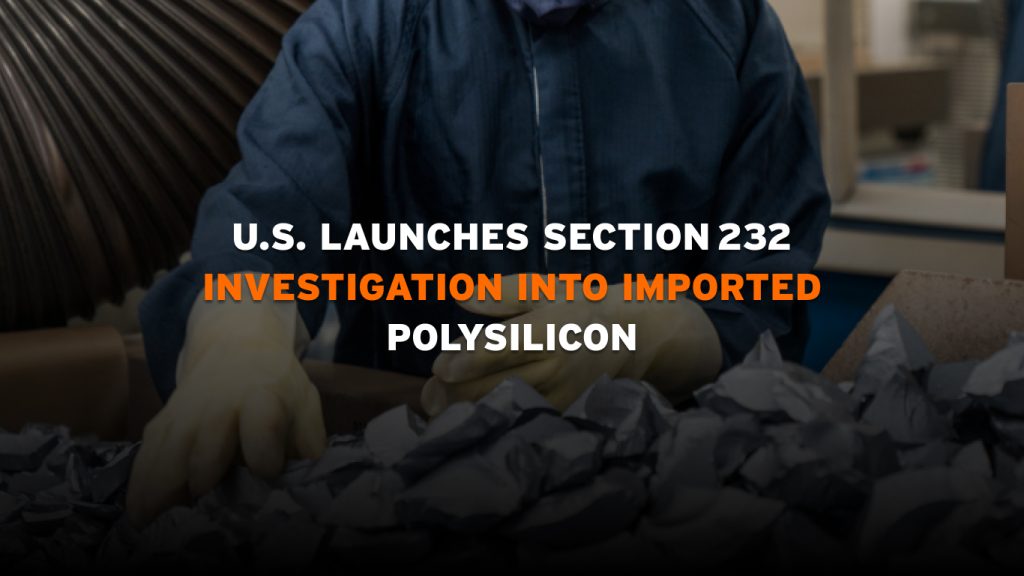The U.S. Department of Commerce has opened a national security investigation into imports of polysilicon and its derivatives under Section 232 of the Trade Expansion Act of 1962. Polysilicon is a fundamental raw material used in solar panels and semiconductor manufacturing.
What Triggers a Section 232 Probe
Section 232 allows the Commerce Department to assess whether imported goods pose a threat to national security. This assessment includes examining foreign dependence, the concentration of supply, and the impact of foreign subsidies or price manipulation on U.S. industries and supply chains. (Source: PV Tech)
Polysilicon investigation commenced on July 1 but was disclosed publicly only in recent days. The probe aims to evaluate whether imports are being “weaponized” by foreign states, whether supply chains are overly concentrated, and what repercussions this may have for U.S. competitiveness. (Source: Financial Times)
Why Polysilicon Matters
Polysilicon is key to photovoltaic (PV) cell production for solar panels as well as in semiconductor fabrication. China controls more than 90 percent of the global polysilicon market, raising concerns among U.S. officials. Previous trade actions in January raised tariffs from 25 percent to 50 percent on Chinese polysilicon and solar wafers under Section 301. This latest Section 232 probe adds another layer of scrutiny to renewable energy supply chains. (Source: Financial Times)
Domestically, polysilicon production is limited. Industry data suggest the U.S. currently under-produces compared to annual PV module demand. Though U.S. companies like Hemlock Semiconductor and Wacker operate in this space, capacity remains limited.
(Source: PV Tech)
Implications for U.S. Solar Market
The investigation could produce several outcomes, including new tariffs or quotas on polysilicon imports. Potential impacts include:
- Raised costs for solar panel manufacturing – Additional duties may increase material costs for U.S. solar producers.
- Encouraged domestic investment – Policymakers hope higher import costs drive stronger investment and expansion of local polysilicon production.
- Supply chain volatility – The probe may create temporary uncertainty in polysilicon availability and pricing.
- National security reassurances – A more secure supply chain for renewable technologies could reduce risks associated with dependence on foreign sources.
How the Investigation Will Proceed
The Commerce Department will request data from U.S. producers, importers, and relevant foreign companies. Agencies will evaluate supply sources, export barriers, and pricing trends. A report must be delivered within 270 days. If national security risks are identified, the President can authorize tariffs or quotas to address them.
(Source: Mercomindia.com, Reuters)
Wider Context of U.S. Trade Policy
This polysilicon probe follows a growing pattern of Section 232 investigations into key materials such as drones, aircraft, truck parts, semiconductors, and pharmaceuticals. It underscores the administration’s effort to secure critical supply chains and reduce reliance on dominant foreign suppliers—especially in China. (Source: Reuters)
Industry experts warn that while boosting domestic capacity is the intent, aggressive trade measures can disrupt supply availability and raise costs, particularly in the solar sector. A careful balancing act will be required to support U.S. competitiveness without hampering renewable energy deployment.
What Comes Next
Industry stakeholders, manufacturers, and solar developers are advised to:
- Monitor Federal Register updates – A notice inviting comments will be published soon.
- Prepare data submissions – Stakeholders should provide evidence on sourcing, costs, subsidies, and supply risks.
- Assess cost impact – Companies may need to update financial projections to reflect potential material cost increases.
- Engage policymakers – State regulators and industry groups should advocate for policies that align national security with renewable energy growth.
The outcome of this investigation will have long-term implications for U.S. clean energy strategies, domestic solar manufacturing, and global competitiveness.
Bottom Line
Launching a national security investigation into polysilicon signals a pivotal shift in U.S. energy-trade policy. Solar Power World emphasizes that reinforcing critical materials supply chains must be matched with strategic industry support. Whether tariffs stabilize domestic production or slow solar deployment will depend on how the probe unfolds over the coming months.




